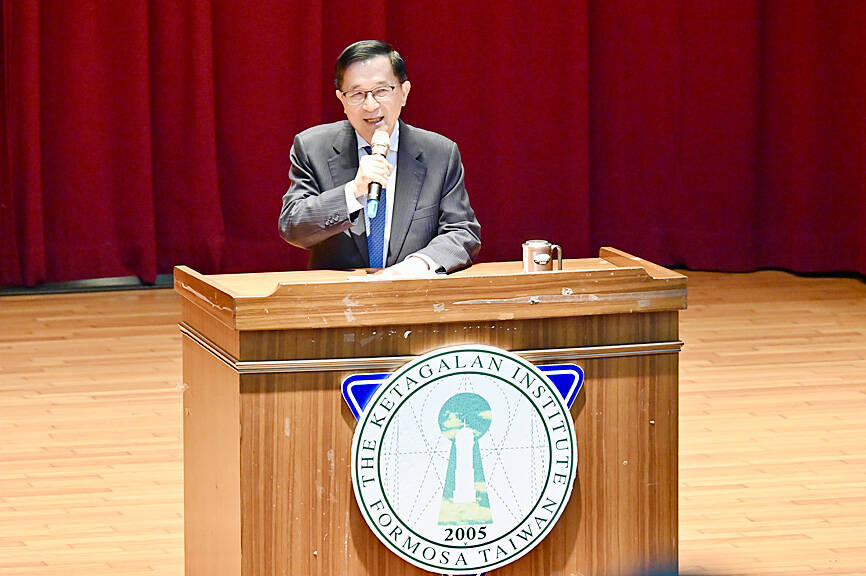True democracy requires respecting minority views and the Constitutional Court should not be used to resolve political disputes, former president Chen Shui-bian (陳水扁) said on Saturday.
In a speech titled “The Resilience and Transformation of Taiwan’s Democracy” at the Ketagalan Institute in Taipei, Chen’s first public talk in 17 years, he said that a core value of democracy is tolerating, respecting and including different voices, and that no one person is more important than others.
Choice is the core of a democratic system, and citizens are the true masters of their country and its leader, he said.

Photo: George Tsorng, Taipei Times
The separation of powers and a system of checks and balances are crucial in ensuring that no one body or individual can wield total or disproportionate power, he added.
Every president and administration has their own way of doing things, and no one is necessarily right or wrong, Chen said, adding that he could only speak to his experience governing, during which tolerance and mutual respect were important.
During the two months before he first took office in 2000, he met with then-outgoing president Lee Teng-hui (李登輝) 10 times, he said.
That year he hosted a summit with opposition and ruling party leaders — including then-Chinese Nationalist Party (KMT) chairman Lien Chan (連戰) and People First Party Chairman James Soong (宋楚瑜), among others — at the Presidential Office, he said, adding he took Lien’s advice on the economy at that time.
Regarding the current administration’s call for constitutional interpretations, Chen said that Constitutional Court justices should not be called upon to step in as arbiters on every issue.
The justices should not get involved in political disputes and government branches should not take advantage of them or put them in an unfair position, he added.
Democracy is the best path for Taiwan and the nation should not regret pursuing it, Chen said.
National sovereignty belongs to all citizens, and only Taiwan’s 23 million people can decide the nation’s future, he said.

The Coast Guard Administration (CGA) yesterday said it had deployed patrol vessels to expel a China Coast Guard ship and a Chinese fishing boat near Pratas Island (Dongsha Island, 東沙群島) in the South China Sea. The China Coast Guard vessel was 28 nautical miles (52km) northeast of Pratas at 6:15am on Thursday, approaching the island’s restricted waters, which extend 24 nautical miles from its shoreline, the CGA’s Dongsha-Nansha Branch said in a statement. The Tainan, a 2,000-tonne cutter, was deployed by the CGA to shadow the Chinese ship, which left the area at 2:39pm on Friday, the statement said. At 6:31pm on Friday,

The Chinese People’s Liberation Army Navy’s (PLAN) third aircraft carrier, the Fujian, would pose a steep challenge to Taiwan’s ability to defend itself against a full-scale invasion, a defense expert said yesterday. Institute of National Defense and Security Research analyst Chieh Chung (揭仲) made the comment hours after the PLAN confirmed the carrier recently passed through the Taiwan Strait to conduct “scientific research tests and training missions” in the South China Sea. China has two carriers in operation — the Liaoning and the Shandong — with the Fujian undergoing sea trials. Although the PLAN needs time to train the Fujian’s air wing and

Taiwanese celebrities Hank Chen (陳漢典) and Lulu Huang (黃路梓茵) announced yesterday that they are planning to marry. Huang announced and posted photos of their engagement to her social media pages yesterday morning, joking that the pair were not just doing marketing for a new show, but “really getting married.” “We’ve decided to spend all of our future happy and hilarious moments together,” she wrote. The announcement, which was later confirmed by the talent agency they share, appeared to come as a surprise even to those around them, with veteran TV host Jacky Wu (吳宗憲) saying he was “totally taken aback” by the news. Huang,

The American Institute in Taiwan (AIT) put Taiwan in danger, Ma Ying-jeou Foundation director Hsiao Hsu-tsen (蕭旭岑) said yesterday, hours after the de facto US embassy said that Beijing had misinterpreted World War II-era documents to isolate Taiwan. The AIT’s comments harmed the Republic of China’s (ROC) national interests and contradicted a part of the “six assurances” stipulating that the US would not change its official position on Taiwan’s sovereignty, Hsiao said. The “six assurances,” which were given by then-US president Ronald Reagan to Taiwan in 1982, say that Washington would not set a date for ending arm sales to Taiwan, consult